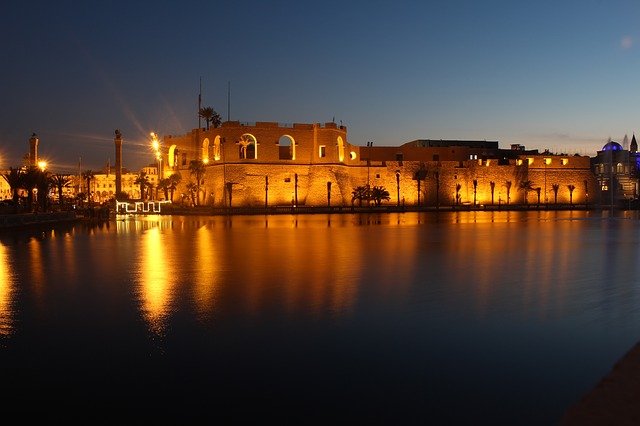By Tim Lambert
Ancient Libya
At first, Libya was inhabited by Berber tribes. After 1,000 BC a people from Lebanon called the Phoenicians settled in Tripolitania (western Libya). They founded Tripoli. Later, the ancient Greeks settled in Cyrenaica (eastern Libya).
Later, both areas of Libya became part of the Roman Empire. A Roman Emperor called Septimius Severus (193-211) was a native of the great city of Leptis Magna in Roman Libya. Unfortunately, Leptis Magna was severely damaged by an earthquake in 365.
Then in the 4th century, the Roman Empire split into two. Cyrenaica became part of the Eastern Roman Empire while Tripolitania was part of the Western Empire. In 431, a Germanic people called the Vandals captured Libya, but Justinian, emperor of the Eastern Empire, forced them out in 533.
Then, in 642-44, the Arabs conquered Libya. They brought Islam. During the 16th century, Libya became part of the Turkish Empire. It remained part of the Turkish Empire for centuries, although it was a haven for pirates.
Modern Libya
However, in 1911, the Italians invaded Libya. The Turks surrendered Libya to Italy in 1912. However, resistance from the people of Libya continued for many years.
Until 1922, the Italians only controlled the coastal region. However, the Fascist regime in Italy was determined to subdue all of Libya, and by 1932, it was in control of the whole country. The conquest of Libya by Fascist Italy was extremely brutal, and many Libyans died as a result. Mussolini, the Italian dictator, encouraged Italians to emigrate to Libya, and by 1939, there were 150,000 of them living in the country.
In 1940, Italy joined the Second World War on Germany’s side, and Italian forces based in Libya fought the British in Egypt. However, in 1943, the British took Libya. After the war, Libya was controlled by the British and French.
By the Peace Treaty of 1947, Italy gave up all claims to Libya. Then, in 1949, the UN decreed that Libya must become independent by 1 January 1952. A constitution for Libya was drawn up, and Muhammad Idris al Sanusi was chosen as king. King Idris, I declared Libya independent on 24 December 1951.
At first, Libya was an impoverished country. However, Libya was changed forever in 1959 when oil was discovered. Oil brought new wealth to the country, and by the mid-1960s, Libya was one of the most important oil-producing countries in the world.
However, on 1 September 1969, a group of army officers led by Muammar Gaddafi staged a coup in Libya. The monarchy was abolished. Gaddafi became the dictator of Libya and remained in power for 42 years.
In 1984, the UK broke off diplomatic relations with Libya after a policewoman was killed outside the Libyan embassy in London. In 1986, a bomb exploded in a German nightclub. The USA believed Libyans were involved, so they bombed Libya.
In 1992 and 1993, the UN imposed sanctions on Libya because of its involvement in destroying a passenger plane over Lockerbie in 1988. In 1999, Gaddafi finally surrendered 2 men suspected of involvement. The UN sanctions were suspended, but they were not formally lifted until 2003.
Meanwhile, in 1999, the Italian government apologized for the brutal conquest of Libya decades earlier.
However, in 2011, there was a revolution in Libya, and Gaddafi was killed.
In the early 21st century, Libya was still dependent on oil. Libya still has very large reserves of oil. However, Libya suffered high unemployment. In 202,3 the population of Libya was 7 million.

Last revised 2025